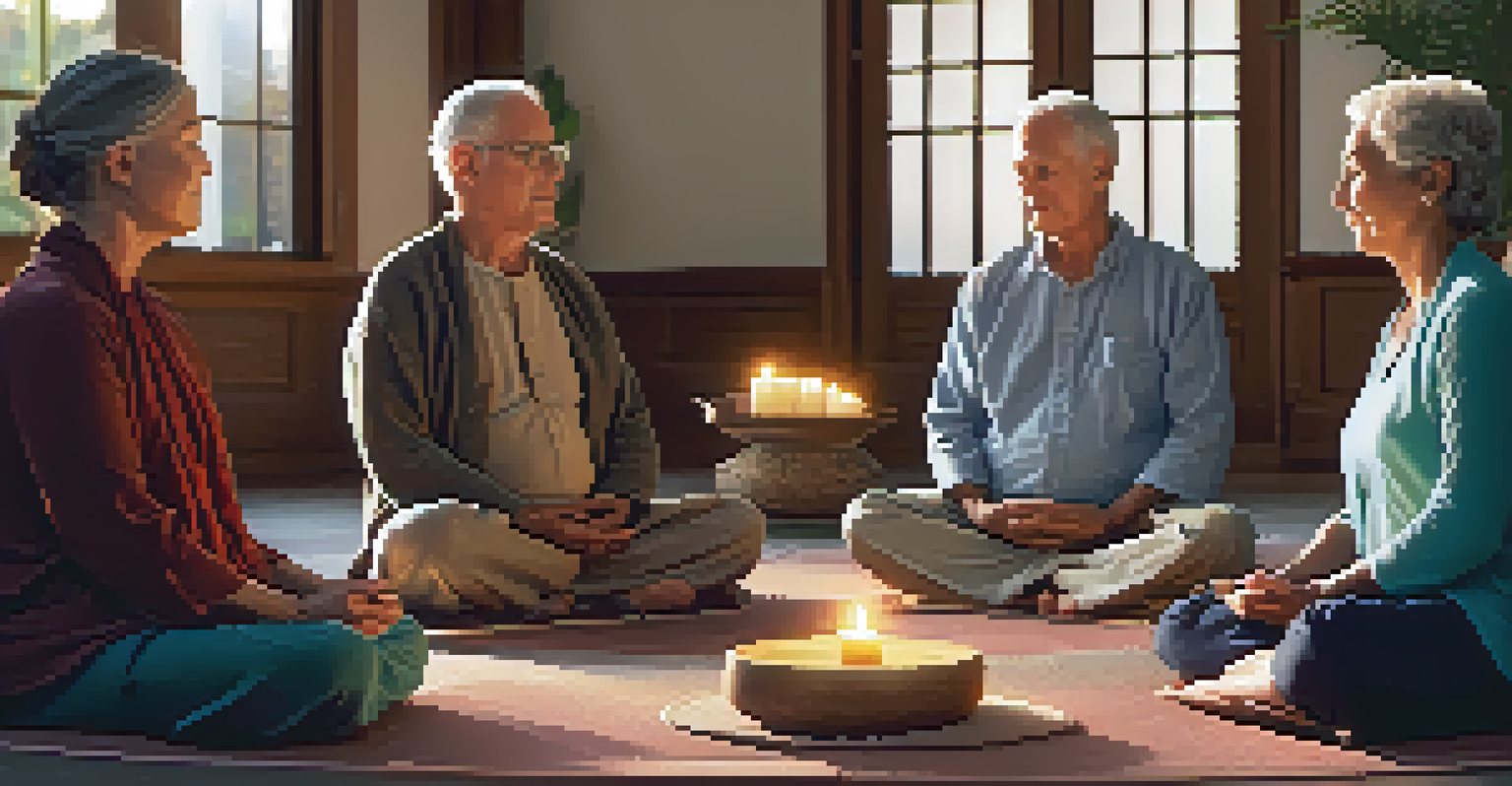Meditation Benefits: Enhancing Mental Health in Older Adults

What is Meditation and Its Relevance for Older Adults?
Meditation is a practice that involves focusing the mind to achieve a state of calm and clarity. For older adults, it can be particularly beneficial as it offers a way to navigate the complexities of aging. By promoting mindfulness, meditation encourages individuals to live in the moment, which can be a refreshing change from the worries about the past or future.
Meditation is not about stopping thoughts, but recognizing that they are just thoughts and that they don't have to control your life.
As we age, our mental landscape can become cluttered with stressors like health issues, loss of loved ones, and loneliness. Meditation provides a tool to declutter this mental space, allowing older adults to find peace and acceptance amidst these challenges. It’s like clearing out a crowded attic; once the clutter is gone, you can appreciate the valuable items that remain.
Additionally, meditation is accessible and can be practiced anywhere, making it an ideal activity for older adults. Whether it’s through guided sessions, apps, or simple breathing exercises, the flexibility of meditation means anyone can incorporate it into their daily routine.
Mental Health Improvements: What Studies Show
Research has shown that meditation can lead to significant improvements in mental health for older adults. Studies indicate that regular practice can reduce symptoms of anxiety and depression, which are common in this age group. For many, meditation acts as a calming balm, soothing the turbulent thoughts that can accompany aging.

One study found that participants who engaged in mindfulness meditation reported lower levels of stress and increased feelings of well-being. This aligns with the idea that taking time to meditate allows for reflection and a shift in perspective. Think of it as taking a mental vacation; even a few minutes away from daily pressures can rejuvenate the mind.
Meditation Enhances Mental Health
Regular meditation practice can significantly reduce anxiety and depression among older adults, promoting overall well-being.
Moreover, meditation has been linked to enhanced emotional resilience. Older adults practicing meditation often find they can bounce back from stressors more effectively. This resilience not only uplifts their mood but also contributes to a more positive outlook on life.
Cognitive Benefits: Sharper Minds with Meditation
Meditation can also support cognitive function, which is crucial as we age. Regular practice has been shown to improve attention, memory, and overall cognitive flexibility. Imagine your brain as a muscle; just like physical exercise strengthens your body, meditation can enhance your mental agility.
The mind is everything. What you think you become.
Studies suggest that meditation helps increase the thickness of the prefrontal cortex, the area of the brain responsible for complex thinking and decision-making. This means that engaging in meditation can not only keep the mind sharp but also promote better problem-solving skills in older adults.
Furthermore, meditation enhances focus and concentration, making it easier for older adults to engage in their daily activities. This can include anything from reading a book to enjoying meaningful conversations with family, allowing for a more fulfilling life experience.
Physical Health Benefits: The Mind-Body Connection
The benefits of meditation extend beyond mental health to physical well-being as well. Engaging in mindfulness practices can lower blood pressure, reduce chronic pain, and improve sleep quality. When older adults meditate, they often experience a sense of relaxation that can contribute to overall physical health.
Additionally, by decreasing stress levels, meditation can have a profound impact on the body. Chronic stress is linked to numerous health issues, from heart disease to weakened immune function. Think of meditation as a wellness routine; just as you would exercise or eat healthy, taking time to meditate nurtures both mind and body.
Boosts Cognitive Function
Meditation improves attention, memory, and cognitive flexibility, helping older adults maintain sharper minds.
Incorporating meditation into a daily routine can lead to lasting changes, helping older adults feel more energized and healthier. This holistic approach to well-being encourages a lifestyle that values both mental and physical health.
Building a Supportive Community Through Group Meditation
Group meditation can foster a sense of community among older adults, helping to combat feelings of isolation. Participating in group sessions creates an opportunity for social interaction, which is vital for mental health. Just as a garden flourishes with the right community of plants, older adults can thrive together through shared experiences.
These gatherings provide a space where individuals can connect, share their journeys, and motivate each other in their meditation practices. This sense of belonging can significantly enhance overall happiness and reduce feelings of loneliness, which are often prevalent in this age group.
Moreover, group meditation often leads to accountability, encouraging participants to maintain their practice. When you're in a supportive environment, it's easier to stay committed, making meditation a regular part of life.
Practical Tips for Getting Started with Meditation
Starting a meditation practice doesn't have to be daunting. For older adults, it's essential to begin with simple techniques, such as focusing on the breath or using guided meditations. Just a few minutes a day can make a noticeable difference, like dipping your toes into a refreshing pool before diving in.
Creating a comfortable space for meditation can enhance the experience. Whether it's a quiet corner of the home or a peaceful garden, having a designated area helps signal to the mind that it’s time to relax and unwind. Setting a regular schedule can also encourage consistency, just like any other healthy habit.
Fosters Community and Connection
Group meditation sessions create social interactions that combat loneliness and enhance happiness among seniors.
Finally, older adults should be patient with themselves as they learn to meditate. It's normal for the mind to wander; acknowledging this without judgment is part of the practice. Over time, meditation becomes easier and more enjoyable, leading to deeper benefits.
The Long-Term Impact of Consistent Meditation Practice
The benefits of meditation aren't just fleeting; they can have a long-lasting impact on older adults' mental health. Regular practice often leads to a more positive mindset and a greater sense of control over one's life. Just like nurturing a plant over time allows it to flourish, consistent meditation cultivates a resilient and peaceful mind.
Over the long term, seniors who meditate frequently may find that they handle life's challenges with more grace and less anxiety. This shift can lead to improved relationships with family and friends, as a calm demeanor often fosters better communication and understanding.

Ultimately, committing to meditation can greatly enhance the quality of life for older adults, ensuring they enjoy their golden years with clarity and joy. By making this simple practice a part of their daily routine, they can embrace the richness of each moment.